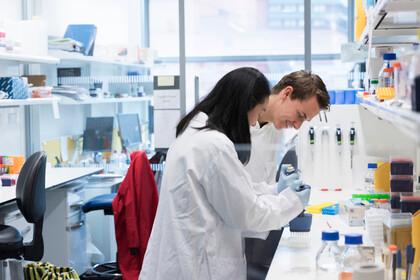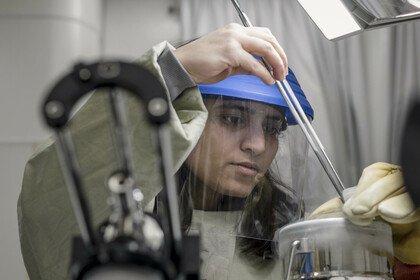
Wellcome’s ambitions for 2022 and beyond
Cheryl Moore, Director of Research Programmes, shares how Wellcome plans to spend £16 billion over the next ten years to advance scientific discovery and take on the world’s most pressing health issues.

Sujan Sarkar
Nine-year-old Rupali carries water for her family to use around the house. It’s salt water. Since 2009, when Cyclone Aila struck Mousuni Island, off the Indian coast south of Kolkata, the community has been reeling. Flooding and riverbank erosion have made the local water saline. The trees have either died or stopped bearing fruit, and agricultural land is infertile. You can just about wash things using salty water from the ponds, but proper, healthy drinking water is horribly scarce.
Sujan Sarkar / Wellcome Photography Prize 2021
Wellcome supports science to solve the urgent health challenges facing everyone. Within that vision are four interlinked programmes: Discovery Research, Infectious Disease, Mental Health, and Climate and Health.
At the start of 2022, we announced that Wellcome plans to spend £16 billion over the next ten years on this work. It is a significant increase and we have bold plans for it: advancing scientific discovery and taking on the world’s most pressing health issues.
Here, I provide a high-level update on how we intend to use our resources – financial and otherwise – to achieve ambitious goals in each area of our work. Throughout 2022, we will be engaging people across the research community, explaining more about our planned approaches and exploring opportunities to work together.
Discovery research
Wellcome’s purpose has always been grounded in the power of basic, fundamental discovery and its potential to change the way we see the world, leading to future improvements in health. That hasn’t changed. Discovery Research remains the largest part of our overall funding portfolio, and we will use both open-mode and directed funding to find new insights and new tools to increase understanding of life and health.
We continue to fund researchers at all stages of their careers and from a wide range of disciplines, including biomedical, physical and social sciences, clinical and non-clinical research, and the humanities. Our Discovery Research schemes are open to researchers in the UK, Ireland and lower- and middle-income countries – the only limiting parameter is that we will not fund purely translational research.
Across that breadth, Wellcome is well placed as an independent foundation to fund and encourage some particular approaches to discovery research.
For example, we are actively looking for work that encompasses diverse and interdisciplinary teams. Innovative ideas often occur when different ways of thinking and expertise are brought together. Given the rapid pace of scientific discovery in recent decades, however, many areas have become siloed. There is an opportunity to speed progress towards improving human health by bringing together different disciplines with sustained funding.
Another approach is supporting the development and use of new tools and technologies that may open up new avenues for discovery. We particularly want to see such tools developed and made available in ways that prioritise equitable access. This reflects our commitment to inclusive, ethical and engaged research environments in all the work we support.
What to look out for
In early spring, we’ll run webinars explaining in more detail the scope of our funding schemes, including Discovery Awards. The first Discovery Early and Mid-career Award scheme recipients will be announced in early summer.
Infectious disease
Our Infectious Disease team is building a programme with global reach that will tackle the reservoirs, sources and drivers of infections that lead to escalating events or outbreaks. Our approach is to confront the scientific gaps that currently limit the ability to intervene before disease burdens start to mount.
We will support work on variants of pathogens that are escaping treatments (through antimicrobial resistance, for example) or protection from existing vaccines. We will fund research to explore the immunological, microbiological and human–environmental factors that drive infections. And we will create platforms that use local and global data on disease patterns and involve those communities most at risk, enabling and encouraging rapid, local, real-time interventions.
Science alone doesn’t solve health challenges. Paths to implementing solutions that prevent and reduce burdens need to be addressed as well.
Wellcome will support the translation of discovery science into affordable medicines, such as vaccines and therapeutics, and enabling interventions such as smart diagnostics and improved regulatory actions. Vitally, we will work to increase both the diversity of people contributing to these interventions, and equitable access to them, by expanding activities in lower-income settings.
What to look out for
More information on specific directions within our Infectious Disease portfolio will follow in the summer; in the meantime, we continue to fund discovery research into infectious diseases and other activities including the research response to the Covid-19 pandemic.
Mental health
Our Mental Health programme focuses on anxiety, depression and psychosis. We have two linked ambitions: first, to gain a greater understanding of how brain, body and environment interact in the development and resolution of these conditions. Second, to develop new and improved ways to predict, identify and intervene as early as possible, both within and beyond healthcare settings, before problems escalate into conditions that hold people back throughout their lives.
Recognising that mental health is a tangle of biological, psychological and social factors, we are going to draw on the full breadth of mental health science across the world. This includes biological science, neuroscience, psychology, psychiatry, neurology, the humanities, social sciences and computer science.
It also involves collaborating closely with people who have lived experience of mental health problems, to ensure we are undertaking research and designing solutions that most fit people’s needs.
Wellcome will bring about a step-change in mental health science by ensuring that:
- research from the frontiers of science is shared more quickly
- trials for new treatments include diverse populations and latest designs
- adoption of common measures allows better comparison of results
- civil society leaders ensure the benefits of mental health science are made available to those in need.
What to look out for
A major funding call in the spring for mental health research that illuminates the mechanisms underlying current effective treatments, in order to provide the basis for the development of new and improved treatments.
Climate and health
Wellcome has previously supported research into climate-related challenges. The difference now is that we will direct our attention specifically to the effects of climate change on health. Given the urgency of the climate crisis, likely to be the greatest threat to human health this century, we will be substantially increasing our work in this space. Wellcome’s significant funding, convening, research and influencing resources will come together to take on this challenge.
A transdisciplinary approach that involves multiple disciplines, communities and policy actors will yield the greatest, and fastest, results. That’s why we will be encouraging diverse teams from all over the world to apply for funding within three main themes:
- understanding the effects of climate change on human health
- developing and advancing interventions that reduce the risk of climate change and protect health
- building an interdisciplinary field of climate and health.
This year, we’ll be laying some of the foundations for our ambitious work in climate and health. For example, to address a need for shared ways of measuring the effects of climate change on human health, we have already funded an early project to develop a framework for quantifying these health impacts.
What to look out for
New funding calls in the coming months – for example, one for digital tools for modelling climate-sensitive infectious diseases, and another for studies that evaluate the effects of heat adaptation solutions on health, with more funding calls to follow later in the year.
Details of opportunities to work with us will be published on this website. Keep up to date with our funding schemes and activities by subscribing to the Wellcome research newsletter and following us on social media.

